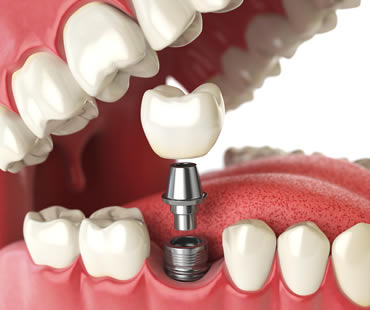
Missing teeth can put a damper on your active lifestyle. You may feel self-conscious about your appearance, experience limitations in diet, or have difficulty speaking. Without a full set of teeth, you risk gum degeneration, bone loss, and other oral health problems. Designed to mimic the look and feel of natural teeth, dental implants can rejuvenate your smile.
What is a dental implant?
A small titanium post that serves as an artificial tooth root, a dental implant is surgically positioned into your gums. Your dentist will place a permanent crown on each implant, which completes the replacement tooth. Implants can be used for one or more missing teeth.
Am I a candidate for dental implants?
In general, anyone with a missing tooth should consider dental implants. The key to successful implant placement is good oral health and sufficient bone structure to support the posts. If you don’t have adequate bone levels, your dentist may recommend a bone graft to correct that situation.
How long does the procedure take?
Receiving dental implants is a two-step process. During the first visit, a trained specialist will surgically implant the posts into your jawbone. Then, you will need to wait three to six months for healing and integration with the jawbone. Once this occurs, your dentist will place the permanent crowns on the implants, giving you a full smile.
How do I care for my implants?
Just like your natural teeth, your implants require daily care. Brush often and floss frequently. Regular dental checkups are also important, so schedule visits at least twice a year.
If you live in the Longview area contact us today

Restoring missing teeth with dental implants is the latest and greatest technique to give you your smile back. It offers many benefits such as comfort, aesthetics, security, and easy maintenance. If you are missing any teeth and would like to learn more about getting dental implants, you need to find a qualified and experienced dental professional for the job. Here are some tips on doing so.
Training
Dentists or oral surgeons who perform dental implants should have training specifically in the procedure. Look for a professional with credentials like a dentistry degree from a reputable university, participation in continuing education programs, and membership in dental organizations.
Reviews
Look online for reviews of the dentist and practice, and be sure to ask friends and family for recommendations. Word of mouth is often the best way to find a healthcare professional.
Examples of work
Ask to see before-and-after pictures of dental implants performed by the dentist. Request to see cases similar to yours.
Technology
A quality dental office should have the latest advancements in technology and equipment so that you will receive the most up-to-date care. Look for equipment like digital X-rays, chair side screens, and dental lasers. Also inquire about sedation or anesthesia methods available in the office.
Convenience
The location of the office should factor into your decision as you choose a professional to perform your dental implant procedure, as well as the office hours and staff. You should feel confident in the care you’ll receive, and feel comfortable asking questions and receiving treatment. Implant treatment requires multiple visits, so choose a dentist who you don’t mind establishing a relationship with over time.
We look forward to seeing you in our Longview dental office

Some patients wonder if dental implants are the best choice for their missing teeth. The time and effort dental implants take can be off-putting to some patients. If you’re wondering if dental implants are really worth it, there are many factors for you to consider.
Dental implant treatment takes a relatively long period of time to complete as well as to completely heal when compared to other tooth replacement options, such as a bridge. The planning process is far more involved than in other missing tooth replacement plans. The materials utilized with dental implants take more time to create in a dental lab and require greater skill and attention than other lab-created tooth replacements.
Dental implants are much stronger than other tooth replacement options, and will last years or even decades longer. When compared to a dental bridge which lasts an average of 14 years, a dental implant can last up to 30 years.
Sometimes, if insufficient bone is present to provide the necessary support for the implant, bone from elsewhere in the body might be grafted onto the existing bone. A dental implant must heal completely before any pressure is put on the new artificial tooth roots. This can take up to three months. After this time, the tooth portion of the dental implant is applied.
Dental implants are the strongest, best choice for a patient with a missing tooth. They rarely fracture and never decay. As opposed to a dental bridge that necessitates the removal of some of your natural tooth structure, a dental implant preserves adjacent teeth and allows patients the most natural, ideal choice for tooth replacement.
Dental implant candidates who are willing to be patient and plan for the future can experience the benefits these restorations have to offer. Talk to your dentist if you want to explore your options for replacing one or more missing teeth.
Our dental office is located in Longview

It’s more common that you might think for adults to lose one or more teeth due to injury or oral diseases. Missing teeth can make chewing and speaking difficult, not to mention lowering a person’s self esteem. That’s why it’s smart to ask your dentist about tooth replacement options, to see if one of them might be right for you.
Dental implants
When artificial tooth roots are inserted into your jaw to replace lost teeth, it’s called dental implants. It involves surgically placing a metal post into the bone under your gums. Then a crown is attached to the post, creating a natural-looking replacement tooth. Dental implants do not affect adjacent teeth, and they look and feel like natural teeth. They are also more secure than other tooth replacement options. However, to be considered for dental implants, you must be healthy overall, have a secure and strong jawbone, and have healthy gums.
Dental bridges
Also called a fixed partial denture, the purpose of a dental bridge is to “bridge” or close the gap between your missing tooth or teeth and your surrounding teeth. Your dentist bonds the bridge onto the teeth adjacent to your gap. This is called a fixed bridge. There are also removable bridges, which you are able to remove, clean, and replace yourself. Another type of dental bridge is called an implant bridge, which attaches to a dental implant. The various types of dental bridge are made from materials like gold, alloys, and porcelain.
Dentures
When you need a tooth replacement option for all or most of your teeth, dentures may be the best choice. Complete dentures are used when you have no teeth left, or the remaining teeth must be removed. These cover both your upper and lower gums. Overdentures are removable and may be used if you have some natural teeth remaining, or have dental implants. These are only an option if your remaining teeth or implants can provide enough support for the overdentures.
We look forward to seeing you in our Longview dental office

People are talking about dental implants. They’re talking about what a secure, longterm solution they are for patients with missing teeth and how successful they are for dental patients of all types. Are you wondering if you’re a candidate for dental implant treatment? The answer is yes, you probably are!
The one factor that’s a must for being a dental implant candidate is that you must have a missing tooth. The AAOMS (American Association of Oral and Maxillofacial Surgeons) estimates that as many as 70% of all adults have lost a minimum of one adult tooth. If you are among this group and you have a missing tooth, you’re a candidate for dental implants. Some patients are better suited to this particular treatment, however, so making an informed decision regarding your particular tooth replacement is vital.
The healthier you are, the more successful your dental implant surgery will be. Some health conditions and diseases should be strongly factored into whether or not dental implants are the best tooth replacement option. Patients with the following conditions may experience difficulty in the fusing of implant and bone:
- Smoking
- Cancer
- Radiation to the jaws or face
- Diabetes
- Drug or alcohol dependency
- Acute gum disease/periodontitis
Typically, a tooth is lost due to an accident, tooth decay, advanced gum disease or a failed root canal treatment. Even though the cause of the tooth’s loss might be through poor oral health, the healthier your mouth and surrounding teeth are, the more successful a dental implant will be.
Because the health of the bone is directly related to the strength of the fusion of the bone to implant, patients with healthier bones will have more successful experiences with dental implants. Maintain a diet high in calcium and other bone-nourishing nutrients and drink plenty of fluids.
We look forward to seeing you in our Longview dental office

Many patients seeking the stability and durability of dental implants wonder what the difference is between mini implants or standard sized dental implants. The basic differences are with regard to their intended function.
A standard dental implant is larger than 3 millimeters in diameter and is made up of two parts: the screw and the abutment. The screw portion of a dental implant is made of titanium, a non-toxic metal well tolerated by the body. The success of all dental implants is due to this bio-compatibility. Materials that aren’t tolerated by the body can create a response by the immune system and may lead to serious problems over time.
With a standard implant, the screw has two threaded areas: external, to screw into the bone and internal, to accommodate any components that are screwed into the implant for security. This internal area provides for the abutment. It is on this abutment that the tooth portion of a dental implant is attached. It also holds dentures firmly in place.
A mini dental implant is smaller than 3 millimeters in diameter and has one solid piece instead of screw and abutment. A mini implant has a solid screw body with a rounded ball shape that extends out of the jawbone. This rounded ball can hold a denture with a corresponding slot, keeping the restoration firmly in place.
Because they are smaller, mini implants provide less support than a standard implant. For example, four mini implants would be needed to hold a patient’s lower dentures in place securely. For the same job, only two standard sized implants would suffice.
Consult your dentist to determine if mini implants or standard implants are right to address your missing tooth or teeth. Get the right implant for your specific needs.
Our dental office is located in Longview









